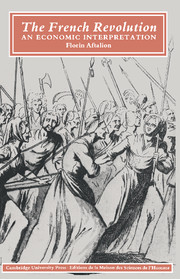Book contents
- Frontmatter
- Contents
- List of figures
- Chronology
- Acknowledgements
- Introduction
- 1 The fiscal crisis
- 2 The French economy at the end of the ‘Ancien Régime’
- 3 1789
- 4 The ‘assignats’
- 5 The finances of the Constituent Assembly
- 6 The rising cost of living, anarchy and war
- 7 The seizure of power by the Mountain
- 8 Economic dictatorship
- 9 ‘Dirigisme’ in retreat
- 10 The French Revolution: economic considerations
- Appendices
- I The final budget of the Ancien Régime
- II The grain trade
- III The life of Dupont de Nemours
- IV The value of the bids made for biens nationaux
- V Econometric study of the depreciation of the assignats
- Notes
- Select guide to further reading
- Index
IV - The value of the bids made for biens nationaux
Published online by Cambridge University Press: 05 June 2012
- Frontmatter
- Contents
- List of figures
- Chronology
- Acknowledgements
- Introduction
- 1 The fiscal crisis
- 2 The French economy at the end of the ‘Ancien Régime’
- 3 1789
- 4 The ‘assignats’
- 5 The finances of the Constituent Assembly
- 6 The rising cost of living, anarchy and war
- 7 The seizure of power by the Mountain
- 8 Economic dictatorship
- 9 ‘Dirigisme’ in retreat
- 10 The French Revolution: economic considerations
- Appendices
- I The final budget of the Ancien Régime
- II The grain trade
- III The life of Dupont de Nemours
- IV The value of the bids made for biens nationaux
- V Econometric study of the depreciation of the assignats
- Notes
- Select guide to further reading
- Index
Summary
As I have indicated in chapter 5, the auctioning of the biens nationaux saw higher bids being made than had been officially estimated. The conclusion drawn at the time was that these sales were a great success, and this was itself interpreted as a vindication of the new régime and its doings. A few years later, it had to be acknowledged that, if calculations were made in real currency, which had a constant purchasing power, the sums which had been collected were in actual fact much lower than had been anticipated. The universally agreed explanation for the losses suffered by the Treasury in this affair pointed to, on the one hand, the staggering of payments across a long period and, on the other, the severe depreciation of the assignats during this same period.
This explanation, though it takes into account everything that could have been known once events had taken their course, is in need of further refinement. More particularly, one must question whether the process set in motion by the Constituent Assembly was really capable of getting full value for the public lands, at any rate during the period when the first sales were held, that is, towards the end of 1791. To answer this question, suppose we adopt the point of view of a potential purchaser, for example, during the summer of 1791, and ask ourselves what sum he could offer in assignats for a property whose value, correctly assessed, had been 100 gold livres.
- Type
- Chapter
- Information
- The French RevolutionAn Economic Interpretation, pp. 204 - 205Publisher: Cambridge University PressPrint publication year: 1990



